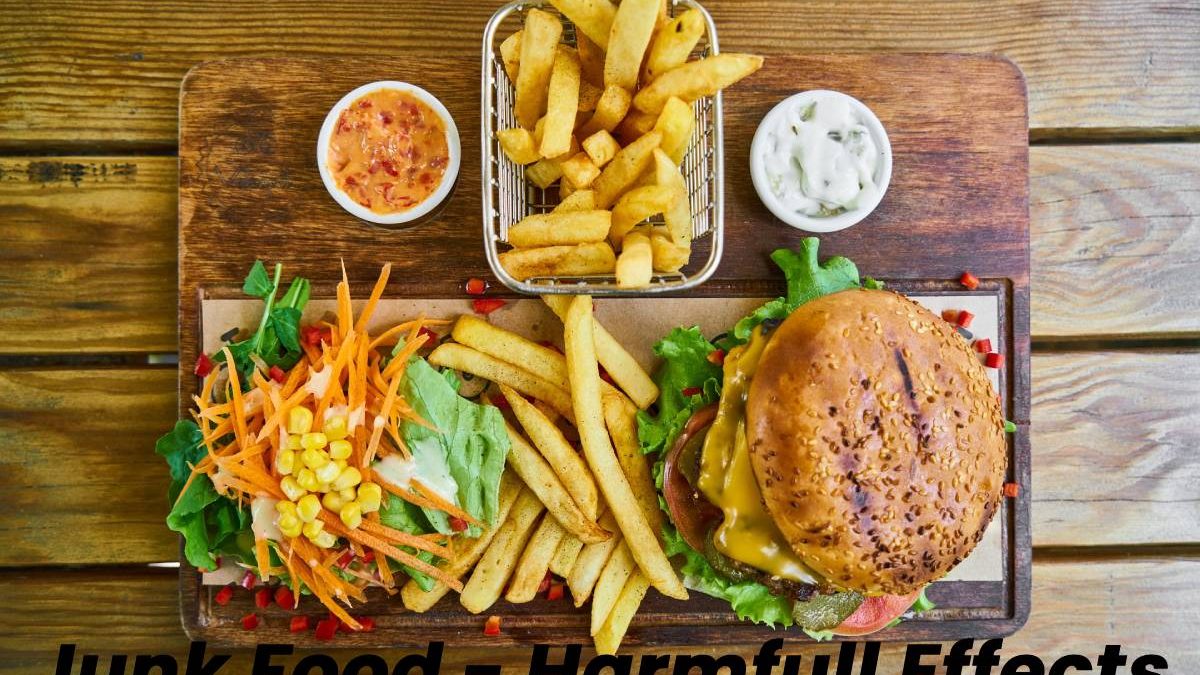Table of Contents
Introduction
Junk food defines as readily available food, generally inexpensive, and has low nutritional value. Common junk foods include fast food, sodas, chips, desserts, and chocolate. These foods contain more calories and more salt, are higher in saturated fat and have less iron, calcium, and dietary fiber.
-
- Junk food is gaining popularity worldwide, and its consumption has grown. Traditional foods have mostly been replaced by canned foods ready to eat at room temperature.
- Consumption of these foods peaked in developed countries. However, there is a growing trend in developing countries around the world.
- Consumption of this junk food is increasing in South Asian countries.
- Despite proven evidence of the adverse effects of junk food on the human body, the consumption of junk food is popular among young people. Such consumption can lead to obesity, diabetes, high blood pressure, and coronary heart disease.
- Worldwide, an estimated 16 million (1.0%) disability-adjusted life expectancy and 1.7 million (2.8%) die due to inadequate consumption of vegetables and fruits.
- Fast food is high in sodium and is often used as a preservative to make meals tastier and more satisfying. These foods are particularly appealing to children and adolescents.
If Food, Why Junk Food?
Food is usually any substance intended to provide nutritional support and help you survive. It boosts the immune system, strengthens bones, supports various bodily functions, including the digestive system. All organs need to maintain position, reduce the risk of disease, support muscles, and promote overall growth. Everyone has different eating habits and preferences. Based on your preferences, you can mainly classify them as vegetarians and non-vegetarians. A vegetarian diet usually includes protein-rich foods such as grams, legumes, vegetables, fruits, healthy fats, legumes, nuts, and seeds. Conversely, a non-vegetarian diet consists of dairy products, meat, fish, seafood, poultry, and eggs. Vegan and non-vegetarian foods are expected to provide the essential nutrients the body needs to convert into energy to perform the body’s various functions.
Have you ever questioned why some of the food we eat is called “junk food”?
Cakes, cookies, processed meat products, packaged foods, sweets, sweets, chocolates, soft drinks, alcoholic beverages, etc., are junk food because they do not achieve the purpose of nutritional supply. Junk food includes any food high in calories, fats, or sugars that are very low in protein, minerals, or vitamins that the human body needs. There are several reasons why these junk foods look tastier than regular nutritious foods. Humans tend to have a strong taste for salt, sugar, and fat, overeating.
Harmful Effects of Junk Food
Snacking on the way to work is a new breakfast trend. Also, healthy home-cooked meals are replaced with foods readily available at your favorite fast-food restaurants. Kids these days tend to prefer these foods and meet their nutritional needs. Only your tongue can satisfy you, but these junk foods have very little nutritional value. Although we often rely on junk food in our busy lives, our regular consumption can cause irreversible damage to our bodies. It’s more clearly called fattening food, but besides the few inches it puts on your back, junk food has profound effects. Some of the harmful effects of a junk diet are damaging to the body and brain. We look at some of the harmful effects of junk food on the body and brain.
Obesity
One of the most common and recognizable effects of junk food is increased obesity in individuals. Junk food contains sugar, calories, and fat, which are the main factors contributing to weight gain. Obesity is also a starting point for diabetes, joint pain, and various heart diseases.
Learning and Memory Problems
Excessive consumption of sugar and fat inhibits the brain’s ability to help learn and form memories. This phenomenon is primarily observed in children growing up when learning is at its peak. A study issued in the American Journal found that junk food consumption worsened cognitive test results. The result is a sudden inflammation of the hippocampal area of the brain responsible for memory and cognition.
Loss of Appetite and Digestion
One of the harmful effects of junk food is overeating. Fluctuations in blood sugar levels can cause you to eat more than you need. It makes the brain ask for more food than it usually requires. Additionally, there is a problem with the digestion of these foods, which adds to the detrimental effects of junk food consumption.
Psychological Effects Leading to Depression
Excessive consumption of junk food changes the chemical makeup of the brain. These changes make the body more dependent on these junk foods and crave more and more. It further creates a hormonal imbalance in the body, making you crave junk food more. It works almost like an addiction, and people experience withdrawal symptoms, and can lead to depression.
Inadequate Growth and Development
A healthy body needs nutrients essential for growth and development. The harmful effects of junk food are apparent, but they also lack crucial nutrition. These unhealthy habits disrupt the brain and other body parts and inadequate nutritional levels. Health nutritionists do not recommend overeating processed foods because they have long-term effects on the body. So, before you eat these chips or give up your cravings for soda, think about all the harmful effects of junk food, not just your body. Also, your mind. You may not have enough time to make and cook meals at home, but protect yourself from unexpected emergencies by taking extra steps to stay healthy and investing in health insurance. After all, your health is your most incredible wealth.
Why Is Junk Food So Addictive?
They are Means, medium. And you’re Experiencing that all too familiar afternoon blues. Causes a fierce desire for sugar (or salt or caffeine).
Believe it or not, food producers often create foods to ignite that cycle of addiction in consumers. Their goal is the “happiness point” in a product. This is the point at which the diner experiences a maximum pleasure, with neither too much nor too little salty, sweet and fatty flavor. These combinations are specifically hard to resist, and your brain reacts similarly to cocaine and other drug addictions. While succumbing to cravings may seem inevitable right now, there are a few simple things you can do to control them.
Here are ten thoughts to get you on track.
1. Estimated plan
2. Buy the perimeter
3. Double Grasses Salad
4. Get enough protein
5. Fruita The Fruita
6. Taste the Rainbow
7. Think about junk food differently.
8. Focus on adding healthy foods
9. Work on stress management
10. Sleep Mars
Suggestions on How to Form Healthy Eating Habits.
-
-
- Plan meals and appetizers ahead of time to decide what to eat based on nutrition rather than what’s left in the pantry.
- Planning will help you stay on budget and make shopping easier.
- Choose whole food options such as whole wheat flour and whole-grain carbohydrates such as pasta, bread, and flour
- Choose fresh fruit for dessert over junk food to avoid added salt, sugar, and saturated fat.
- Use the nutritional information panel on the back of the package to determine the nutritional value of your food.
- Beware of “gimmick” advertisements, including claims that the product is “sugar-free,” as the product may still be high in kilojoules, salt, or fat. One product with less fat than previous versions of the product can claim to be “fat-reducing” but still be high in fat.
- Use the Health Star Assessment system to compare similar packaging items and choose the healthiest one.
Conclusion
Processed foods are often not considered healthy or nutritious. Consciousness knows it’s unhealthy, but other parts of the brain don’t seem to agree. People tend to crave when their brains start to crave certain foods. Some people do not experience this and can easily control their food, while others do not. It’s not a lack of determination; it’s a much more complex situation. Junk food stimulates the brain’s reward system in the same way as addictive drugs like cocaine.
-


